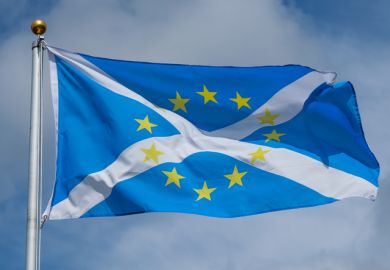Source: Getty
Brace yourself: Belarus is investing in higher education to help shift its economy towards high-technology industries
Walking a diplomatic tightrope between neighbouring Ukraine and Russia, Belarus – a member of the Commonwealth of Independent States – is attempting to adopt liberal market-led policies to improve the quality of its higher education and to attract more international students.
As part of such moves, a deal was signed last month in the capital, Minsk, between a UK awarding body – the Association of Business Executives – and the Belarusian government recognising ABE qualifications as the equivalent of the country’s diplomas of higher education and master’s degrees.
The signing of such a memorandum is part of a campaign by Belarus to join the Bologna Process, a system designed to ensure comparability in the standards of higher education qualifications and to promote freedom of movement within Europe.
“We welcome educational ties with the UK because it is the motherland of the English language,” Sergey Maskevitch, Belarus’ education minister, said at the forum in Minsk where the agreement was signed. “Being able to study for a qualification that is internationally recognised offers our students the confidence to know that their education is the best we can make it. We need graduates to stay in Belarus and help us build our economy.”
By investing 2 per cent of its gross domestic product in improving the quality of its higher education, Belarus hopes to shift a stagnant economy that is reliant on state-owned manufacturing companies supplying Russia with lorries, coaches and chemicals towards high-technology industries. “We have a very good higher educational platform here, but we don’t have enough specialists in business and technology. We would like to see more research devoted to pharmaceuticals and nanotechnology,” said Mr Maskevitch.
Although the Russian higher education “five plus one” model of combining undergraduate and master’s education is widely adopted within Belarus, universities are now trying to shorten degree courses to converge with the Bologna Process. At the same time, degree syllabuses are becoming less prescriptive and more influenced by the views of student councils and employer bodies.
Striving for quality
Belarusian universities have also been upgrading quality management systems to meet European standards in an attempt to become more like the West. Anatoly Osipov, first vice-rector of the Belarusian State University of Informatics and Radioelectronics, said his institution achieved a key European kitemark for quality management in 2010, “and this academic year for the first time we have started offering a four-year undergraduate degree followed by a two-year master’s to bring us closer to the European system”.
Despite these efforts, the Soviet Union’s legacy is still apparent in a country where academic freedom can be constrained and degree syllabuses traditionally need state approval. These are issues that must be resolved ahead of the republic’s Bologna bid.
Deborah Trayhurn, chief operating officer of the private Magna Carta College Oxford, who attended the Minsk forum, said there was still much work to be done to help Belarus meet the Bologna conditions.
“UK universities have the scope to set their own agenda. But in Belarus, much more is laid down already and university practice is centrally arranged and administered. Terms such as efficiency, effectiveness and quality control are philosophically likely to be differently viewed,” said Ms Trayhurn. Magna Carta has set up a base in Minsk to offer ABE qualifications by distance and blended learning.
Internationalisation
Degrees taught in English are also helping to open up Belarus to the West. Institutions such as the Belarusian State University and the BSUIR have recently begun offering undergraduate and postgraduate degrees taught in the language. Already a third of all master’s students and 20 per cent of doctoral students at BSUIR, which has more than 16,000 students in all, are international. “Teaching in English helps us interact better with foreign students and is a lot more successful than trying to teach them the basics of Russian in one year,” Dr Osipov said. As a result of this policy, numbers of international students at BSUIR are doubling year on year, he said.
Although, in the main, international students in Belarus still come from fellow CIS countries such as Uzbekistan and Kazakhstan, many are arriving from as far afield as China, Vietnam, Turkey and Iran. In all, there are now about 16,000 international students in Belarus from 98 countries, a figure that Mr Maskevitch would like to see doubled.
But the key to Belarus’ success – and perceptions about the extent to which it has come in from the cold – may hinge on encouraging students from elsewhere in Europe, particularly in the West, to study there. “Europe is under-represented, but I hope our education reforms will soon change that,” Dr Osipov said.
Register to continue
Why register?
- Registration is free and only takes a moment
- Once registered, you can read 3 articles a month
- Sign up for our newsletter
Subscribe
Or subscribe for unlimited access to:
- Unlimited access to news, views, insights & reviews
- Digital editions
- Digital access to THE’s university and college rankings analysis
Already registered or a current subscriber?





